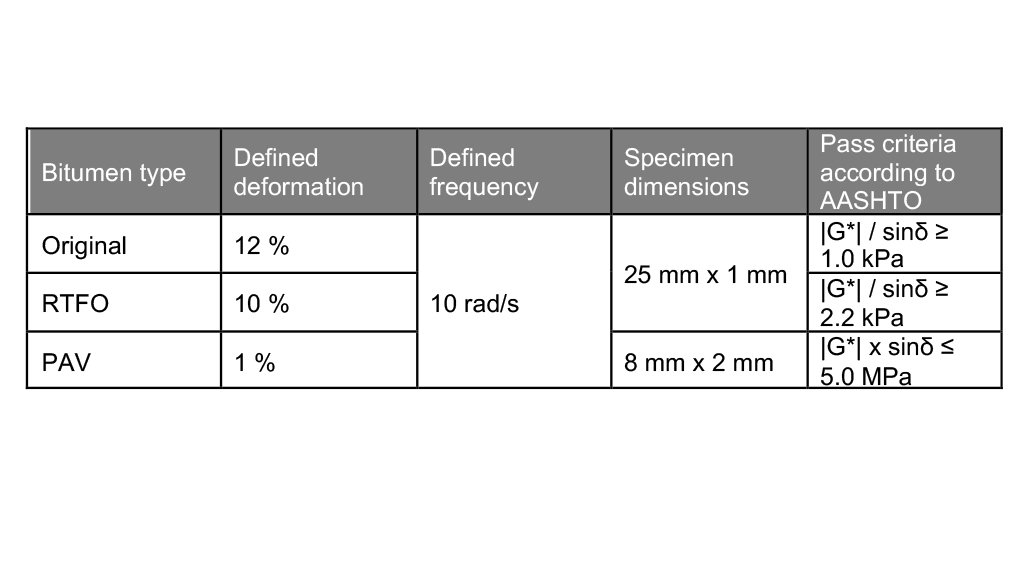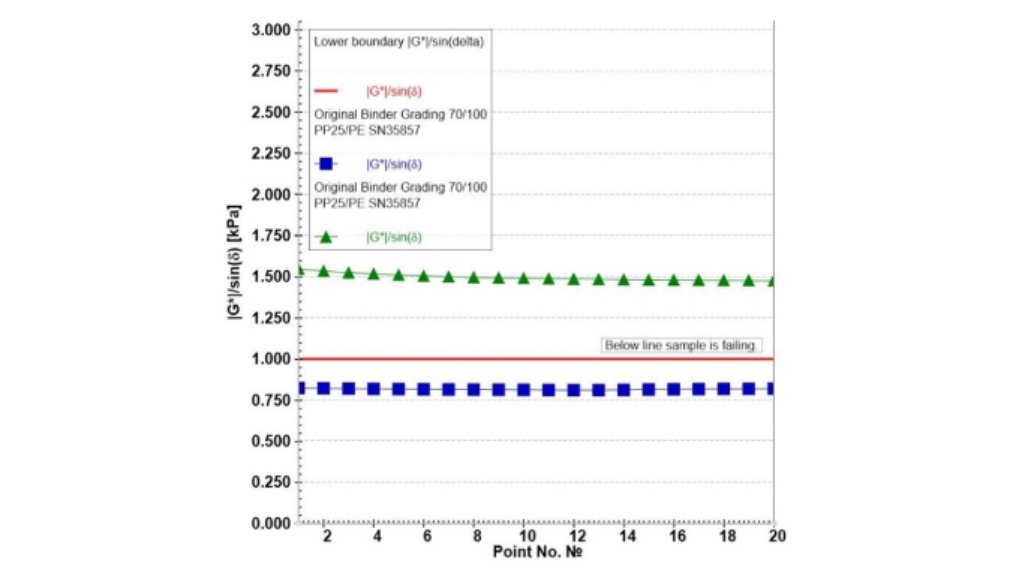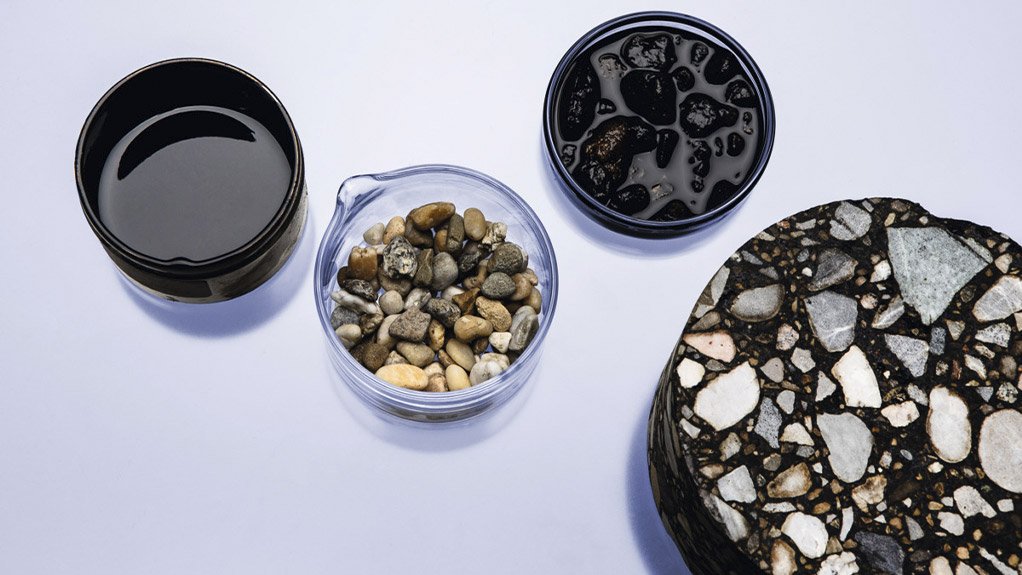Characterisation of Bitumen according to AASHTO T315 / ASTM D7175 with a SmartPave rheometer
How SmartPave devices can be successfully applied for the grading and the verification of different bitumen types according to the American standards
1. SmartPave
The SmartPave device is a dynamic shear rheometer (DSR) and is based on the MCR technology of the MCR rheometer series by Anton Paar with the proven EC drive. The patented Peltier measurement cell in combination with the active Peltier hood enables a fully dry temperature control of the sample. There is a broad choice of standard rheological tests available in the handy software as well as especially tailored test templates for the characterisation of bitumen. These templates allow even unexperienced users to conduct precise measurements according to AASHTO T315 and ASTM D7175 by means of a step by-step guidance.
2. Classification of Different Bitumen Types
Bitumen is typically classified into two different types:
- unmodified bitumen
- polymer-modified bitumen (PmB). The material characteristics of PmB stay almost constant at a defined temperature range, whereas the complex shear modulus |G*| and the viscosity η of the unmodified bitumen decrease continuously with increasing temperature. Modified bitumen exhibits favorable characteristics even at low temperatures. For example, these materials become brittle only at rather low temperatures and therefore show improved fracture behavior over unmodified bitumen.
With regard to the aging condition, bitumen is categorised into three aging stages by applying three different tests:
- Original: newly fabricated, unaged bitumen
- Rolling Thin Film Oven (RTFO): slightly aged bitumen - in order to simulate the processing conditions during road construction
- Pressure Aging Vessel (PAV): severely aged bitumen - in order to simulate the oxidation during the long-term service in traffic including severe UV-radiation among other RTFO- and PAV-aging result in a different increase in stiffness of the bitumen specimens.
3. Test Types
The rheometer software provides test templates according to AASHTO T315 for the common test methods such as the grading as well as the corresponding verification of the grading. Within these tests, |G*| and sin δ are determined, where sin δ equals the sine of the phase angle shift δ.
Grading of original, RTFO- and PAV-aged binder
The grading test helps to determine the high temperature grading of the examined bitumen according to the specifications of AASHTO M320 and M322 which lies between 4 °C and 88 °C.
For this purpose, the bitumen’s visco-elastic properties are determined in an oscillatory test with a plate/plate-measurement system. The applied frequency is independent of the specimen and stays constant during the test. As opposed to that, the deformation as well as the plate diameter and the gap are adjusted to the aging condition of the bitumen (Table 1).
These are single-point measurements, of which the last 10 data points are averaged in order to generate one data point. The ratio |G*| / sinδ [kPa] is calculated for the original and the RTFO-bitumen. For the PAV-bitumen, however, these values are multiplied: |G*| x sinδ [MPa]

Table 1: Specifications according to AASHTO M320/322
The temperature is automatically increased from a defined starting temperature with an increment of 6 °C for the measurement of the original binder and the RTFO-aged bitumen. As the temperature increases, the evaluation value decreases simultaneously. As opposed to that, the temperature is automatically decreased by 3 °C-steps during the measurement of the PAV-aged binder. In this case, the evaluated value increases with decreasing temperature.
The measurement is aborted once the evaluation criteria of the original or RTFO-aged binder falls below or the evaluation criteria of the PAV-aged binder transgresses the defined passing criteria according to AASHTO M320/322 (Table 1). The results provide information about the resistance against a permanent deformation of the binder.
Figure 1 representatively displays a measurement of an original binder. 64 °C was chosen as a starting temperature for the displayed measurement in Figure 1. The first measurement takes place at this temperature (upper, green data set). The evaluation of |G*| / sinδ leads to values around 1.5 kPa. Thus, the bitumen passes the criteria. The temperature is then raised by 6 °C, held for ten minutes and the above described measurement repeated (lower, blue data set). This time the value lies below the passing limit of 1.0 kPa.
The following rules apply for the tested original binder:
- the binder passes the test if the calculated value lies above the defined criteria
- the binder fails the test if the calculated value lies below the defined criteria

Figure 1: Measurement of a standard road construction bitumen with a fail temperature of 70 °C
After the measurement is aborted, the rheometer software automatically creates a protocol which depicts an overview of the essential results.
Verification of the original, RTFO- and PAV-aged binder
The verification complies with the guidelines of the grading according to AASHTO T315 and ASTM D7175. However, this test is conducted at a single temperature. The last temperature of the grading is used for the verification. The two generated results are then compared.
Contact Anton Paar Southern Africa for more information
Gabrielle Chebou, Sales Specialist for Characterisation with focus on Rheometry
Email: gabrielle.chebou@anton-paar.com
Contact number: +27 82 902 8943
Comments
Press Office
Announcements
What's On
Subscribe to improve your user experience...
Option 1 (equivalent of R125 a month):
Receive a weekly copy of Creamer Media's Engineering News & Mining Weekly magazine
(print copy for those in South Africa and e-magazine for those outside of South Africa)
Receive daily email newsletters
Access to full search results
Access archive of magazine back copies
Access to Projects in Progress
Access to ONE Research Report of your choice in PDF format
Option 2 (equivalent of R375 a month):
All benefits from Option 1
PLUS
Access to Creamer Media's Research Channel Africa for ALL Research Reports, in PDF format, on various industrial and mining sectors
including Electricity; Water; Energy Transition; Hydrogen; Roads, Rail and Ports; Coal; Gold; Platinum; Battery Metals; etc.
Already a subscriber?
Forgotten your password?
Receive weekly copy of Creamer Media's Engineering News & Mining Weekly magazine (print copy for those in South Africa and e-magazine for those outside of South Africa)
➕
Recieve daily email newsletters
➕
Access to full search results
➕
Access archive of magazine back copies
➕
Access to Projects in Progress
➕
Access to ONE Research Report of your choice in PDF format
RESEARCH CHANNEL AFRICA
R4500 (equivalent of R375 a month)
SUBSCRIBEAll benefits from Option 1
➕
Access to Creamer Media's Research Channel Africa for ALL Research Reports on various industrial and mining sectors, in PDF format, including on:
Electricity
➕
Water
➕
Energy Transition
➕
Hydrogen
➕
Roads, Rail and Ports
➕
Coal
➕
Gold
➕
Platinum
➕
Battery Metals
➕
etc.
Receive all benefits from Option 1 or Option 2 delivered to numerous people at your company
➕
Multiple User names and Passwords for simultaneous log-ins
➕
Intranet integration access to all in your organisation




















